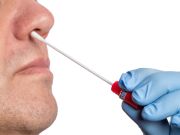- Could Your Grocery Store Meat Be Causing Recurring UTIs?
- Are You Making This Expensive Thermostat Error This Winter?
- Recognizing the Signs of Hypothyroidism
- 10 Strategies to Overcome Insomnia
- Could Artificial Sweeteners Be Aging the Brain Faster?
- Techniques for Soothing Your Nervous System
- Does the Water in Your House Smell Funny? Here’s Why
- Can a Daily Dose of Apple Cider Vinegar Actually Aid Weight Loss?
- 6 Health Beverages That Can Actually Spike Your Blood Sugar
- Treatment Options for Social Anxiety Disorder
FDA Approves First Antigen Test to Quickly Spot Coronavirus Infection

The first emergency use authorization for a COVID-19 antigen test has been issued by the U.S. Food and Drug Administration.
Antigen tests are a new category of tests for use in the coronavirus pandemic and quickly detect fragments of proteins from the virus in samples collected by swab from people’s noses.
The approval was issued Friday to the Quidel Corp. for the Sofia SARS Antigen FIA, which is “authorized for use in high and moderate complexity laboratories certified by Clinical Laboratory Improvement Amendments (CLIA), as well as for point-of-care [ie, doctor’s office] testing,” according to an FDA news release.
“I am very enthusiastic about antigen testing because of its ability to be scaled up to millions of tests a day, and because it has a much more rapid turnaround,” Dr. Ashish Jha, director of the Harvard Global Health Institute, told The New York Times. “A lot of us have been looking forward to this moment.”
“It’s a very rapid test that could be used in a doctor’s office,” former FDA Commissioner Scott Gottlieb explained Sunday on CBS’s “Face the Nation.” “Doctors now have about 40,000 of these Sofia machines already installed in their offices” where they are used to test for strep throat and flu, he explained.
The FDA said it expects to issue more emergency use authorizations (EUAs) for antigen tests during the pandemic.
The agency has issued EUAs for two other types of tests during the coronavirus pandemic. They are: polymerase chain reaction (PCR) tests that detect the genetic material from the virus and can help diagnose active COVID-19 infection, often performed using a nasal swab; and serological [blood] tests that look for antibodies to the virus, which can help identify people who’ve had or have an infection and have developed an immune response to the virus.
Each type of test has a role to play in combating the coronavirus pandemic, the FDA noted.
“PCR tests can be incredibly accurate, but running the tests and analyzing the results can take time. One of the main advantages of an antigen test is the speed of the test, which can provide results in minutes,” the agency explained.
“However, antigen tests may not detect all active infections, as they do not work the same way as a PCR test. Antigen tests are very specific for the virus, but are not as sensitive as molecular PCR tests. This means that positive results from antigen tests are highly accurate, but there is a higher chance of false negatives, so negative results do not rule out infection,” the FDA said.
“With this in mind, negative results from an antigen test may need to be confirmed with a PCR test prior to making treatment decisions or to prevent the possible spread of the virus due to a false negative,” according to the FDA.
More information
The U.S. Centers for Disease Control and Prevention has more on the new coronavirus.
Source: HealthDay
Copyright © 2026 HealthDay. All rights reserved.










